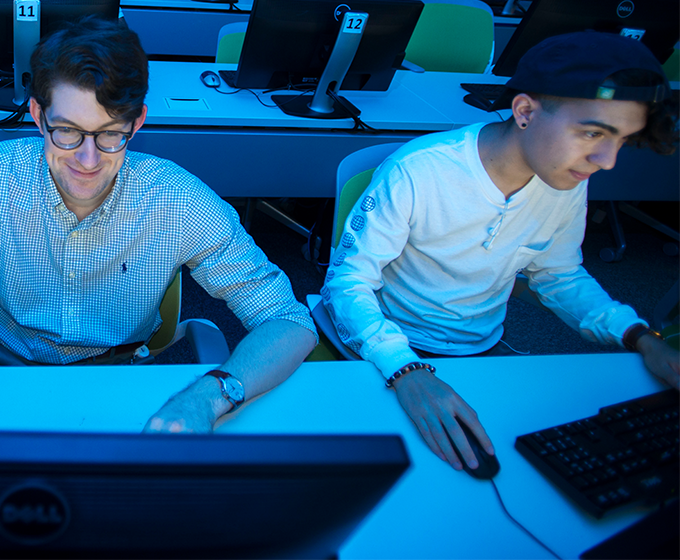
MARCH 25, 2020 — With the computer science industry continuously growing and evolving, UTSA is giving students a way to create and innovate to help add more skills to their toolbelts for the future.
Students will compete this weekend in the fifth annual RowdyHacks online computer coding event. This year, though—because of conditions created by the coronavirus situation—the event will be held fully online for the first time, with the opening ceremony being streamed at 11 a.m. on March 28.
“RowdyHacks is a 24-hour hackathon that our club, the Association for Computing Machinery, puts on every year that we’ve been doing for five years,” said Anna Arroyo, a UTSA senior who is ACM vice president and RowdyHacks manager. “If you’re unfamiliar with what a hackathon is, it’s like a coding competition, where students will get in teams, and they’ll try to build some kind of product by the end of the 24-hour cycle. They’ll then demo whatever they created at the end and compete for prizes.”
Unlike other hackathons that are geared toward people with computer science backgrounds, RowdyHacks is a program for people from all walks of life.
“One thing that we’ve been trying to do over the past couple of years is integrating more majors than just computer science into the hackathon,” said Matt Moore, ACM president and a senior at UTSA. “We want to get rid of the stigma that it’s just for people that know how to code. We want people of all skill levels and backgrounds to be part of our event.”
By bringing in different college disciplines, a good foundation is created, said Mark Robinson, ACM faculty sponsor and assistant professor of practice in the Department of Computer Science.
Leaders on the RowdyHacks Competition
“We want all college disciplines to participate: art, business, engineering, language, science. A great idea can come from anywhere and great ideas are the foundation of a good hackathon,” Robinson said. “In the past few years, engineering teams have done very well at RowdyHacks, in addition to science. Art and music students have been on some of those teams.”
Students have the opportunity to compete in three different categories: cybersecurity track, learners track and the general track.
“Last year we saw a lot of cyber-focused projects, so with San Antonio kind of being like a cyber hub we thought it’d be a good idea to offer its own track,” Arroyo said. “It’s for students who want to do projects focused on security-related topics or make some kind of security tool. Then if you’re not really a first-time coder and you’re not really interested in security—but you do want to make something else—we just have our general track. You can make a website, or you can make an app. That’s pretty much where everything else fits.”
For those who have never coded, there’s the learner track, Arroyo added.
“This year we’re offering a special learner track for students who have never coded before or they don’t feel comfortable in other competitions competing with people who are like senior-level CS majors,” she said. “They have their own like separate workshops at the event to kind of walk them through how to get started with making their own project.”
Similar to the variety of participants the event attracts, the same goes for the projects created.
Last year the judges saw anything from a glove that helps deaf people “feel” music to a smart trash can that utilizes artificial intelligence to separate garbage from recyclables. During the event, students also have the opportunity to mingle with companies present at RowdyHacks.
Over the last five years ACM, an organization run fully by UTSA undergraduate and graduate students, has made it their mission to evolve RowdyHacks from a single classroom event to something that expects as many as 400 participants from all over the county to attend this year.
“We’re really proud of how far we’ve come,” Moore said, “and we just want to keep on improving on how we can make it better.”
UTSA Today is produced by University Communications and Marketing, the official news source of The University of Texas at San Antonio. Send your feedback to news@utsa.edu. Keep up-to-date on UTSA news by visiting UTSA Today. Connect with UTSA online at Facebook, Twitter, Youtube and Instagram.
Move In To COLFA is strongly recommended for new students in COLFA. It gives you the chance to learn about the Student Success Center, campus resources and meet new friends!
Academic Classroom: Lecture Hall (MH 2.01.10,) McKinney Humanities BldgWe invite you to join us for Birds Up! Downtown, an exciting welcome back event designed to connect students with the different departments at the Downtown Campus. Students will have the opportunity to learn about some of the departments on campus, gain access to different resources, and collect some giveaways!
Bill Miller PlazaCome and celebrate this year's homecoming at the Downtown Campus with food, games, giveaways, music, and more. We look forward to seeing your Roadrunner Spirit!
Bill Miller PlazaThe University of Texas at San Antonio is dedicated to the advancement of knowledge through research and discovery, teaching and learning, community engagement and public service. As an institution of access and excellence, UTSA embraces multicultural traditions and serves as a center for intellectual and creative resources as well as a catalyst for socioeconomic development and the commercialization of intellectual property - for Texas, the nation and the world.
To be a premier public research university, providing access to educational excellence and preparing citizen leaders for the global environment.
We encourage an environment of dialogue and discovery, where integrity, excellence, respect, collaboration and innovation are fostered.